'Take it slow': Florida theme parks have accessibility programs but they still require planning
"Traveling with disabilities" is a 10-part series focusing on the experiences of travelers with disabilities. This is part of our continuing mission to highlight underrepresented communities in travel. If you'd like to contribute to our reporting and share your experience as a source, you can fill out this quick form.
Jocelyn and Mike Taylor don't do anything last minute.
The couple's 7-year-old son, Raylan, has Joubert syndrome, a rare genetic disorder that occurs when parts of the brain don't develop properly. Raylan is vision-impaired and unable to walk or talk.
As countless families experience, there's rarely such a thing as spur-of-the-moment travel when a loved one is disabled. The Taylors and others who've learned from experience agree: The first step at any theme park is learning disability accommodations and policies, and if the park's offerings suit their needs.
So when the Taylors book a theme park visit – especially if they're staying overnight – they map out the expected course of their journey to make the most of their time. The Tampa, Florida, couple plans ahead for everything from room size to packing food to potty breaks, stroller suitability and ride safety.
'MY KIDS DON'T WANT HUGS AND KISSES': The cultural dimension of traveling with an invisible disability
'WE TAKE CARE OF FAMILY': When accessible travel is hard to find, families forge their own paths
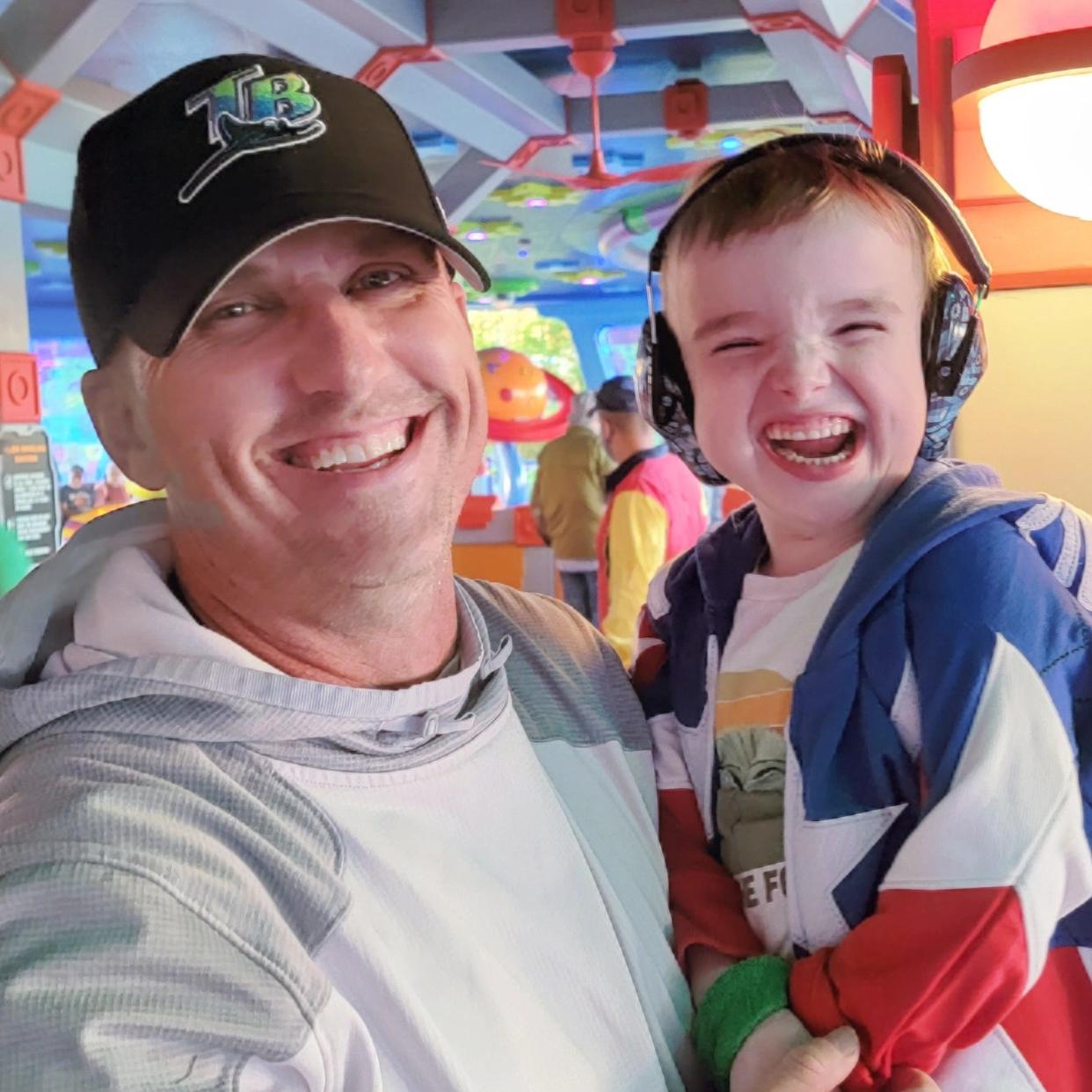
Jocelyn says it's worth the extra prep it takes to see Raylan twirling happily and smiling on the Alien Swirling Saucers at Walt Disney World's Hollywood Studios. Or crying at the end of a ride on the Seven Dwarfs Mine Train roller coaster or a trek onRise of the Resistance – he's a big Star Wars fan.
"He's not completely blind, but there's a lot of suggestions that say either things are really blurry or he can't see very far in front of him," she said. "But on Rise (of the Resistance) ... he can see the lasers and the lights, and just the sounds reminding him of Star Wars ... he loves that so much that he cries when we take him off the ride."
Those tears, Taylor said, show he's happy – and that anything they've had to do "was worth the extra effort."
How accessible are Orlando theme parks?
All major Orlando, Florida, theme parks – Walt Disney World, Universal Orlando, SeaWorld Orlando and LEGOLAND – offer accommodations for disabilities, not just required by law but ones that make for a more inviting experience.
The accessibility section of Universal Orlando's website is particularly specific, with information for guests with hearing disabilities, vision impairments, cognitive disabilities, and those using wheelchairs, prosthetics, oxygen tanks and service animals.
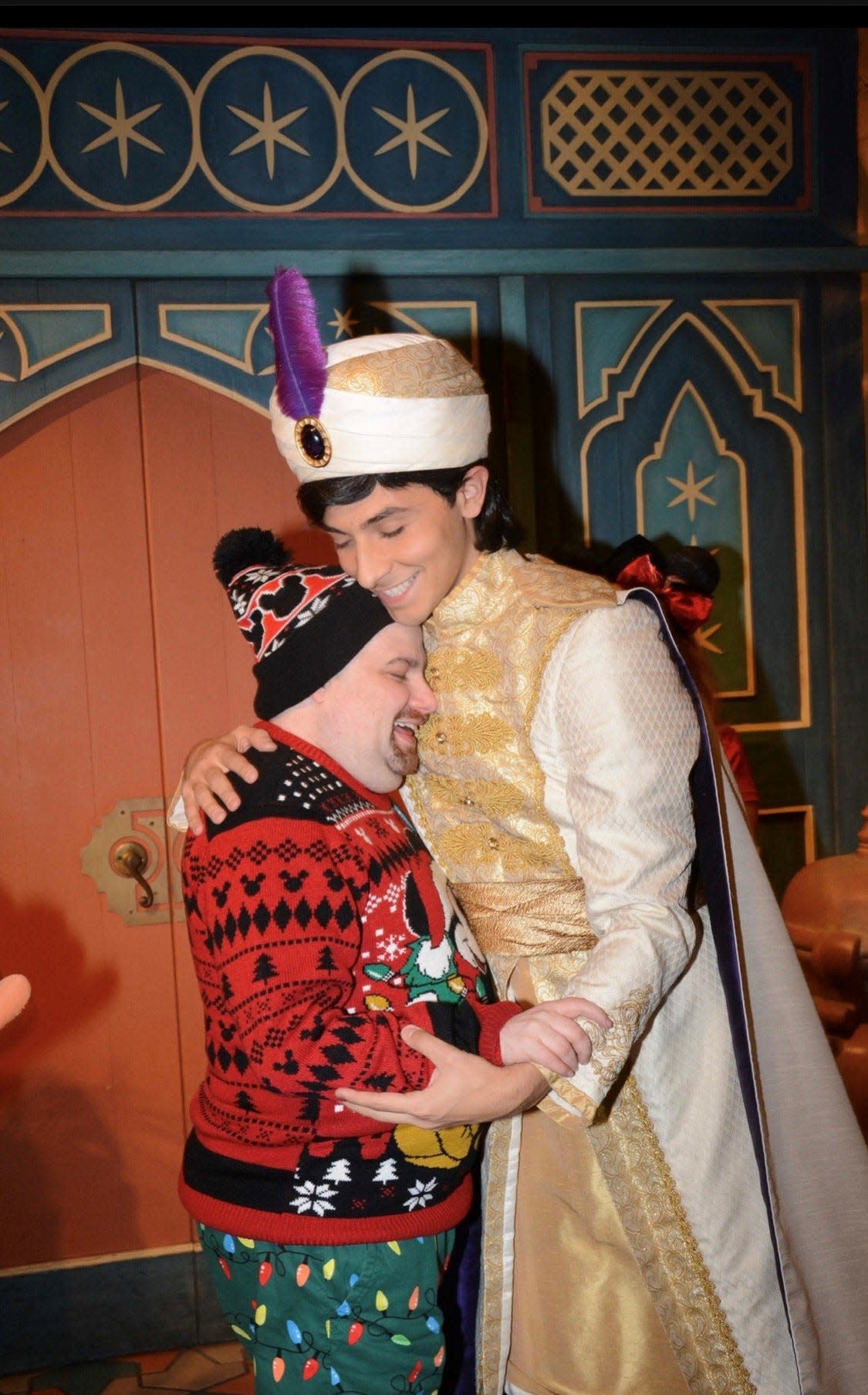
The Guide for Guests with Cognitive Disabilities, available in that accessibility section, goes over most angles. From what to bring – like extra changes of clothes, sensory toys or calming items and diet-specific snacks – to the details of rides and attractions, like whether they're suited for someone who's claustrophobic or can't tolerate strobe effects, or darkness.
For guests who might need respite from sensory overload, a "quiet room" specifically for those with autism and cognitive disabilities opened Monday next to the Studio Audience Center at the front of the park. Reservations are not required but 30-minute time limits are suggested.
Tami Hill is a state of New Jersey clerical worker and a Walt Disney World season pass holder who visits theme parks as often as possible. The 50-year-old's traveling companion is her disabled 42-year-old brother, Patrick Hindermyer. While he can walk, Hindermyer is not good at respecting personal space or long waits in crowded areas, his sister said, and does much better when she pushes him in a wheelchair.
Overall, Walt Disney World works best for her brother. "Pat loves it, and he really doesn't respond to a lot. So we try to hop on whatever $50 flight we can get," Hill said.
She maps out her park adventures accordingly, mindful of the time it will take to push a wheelchair, sometimes on steep areas.
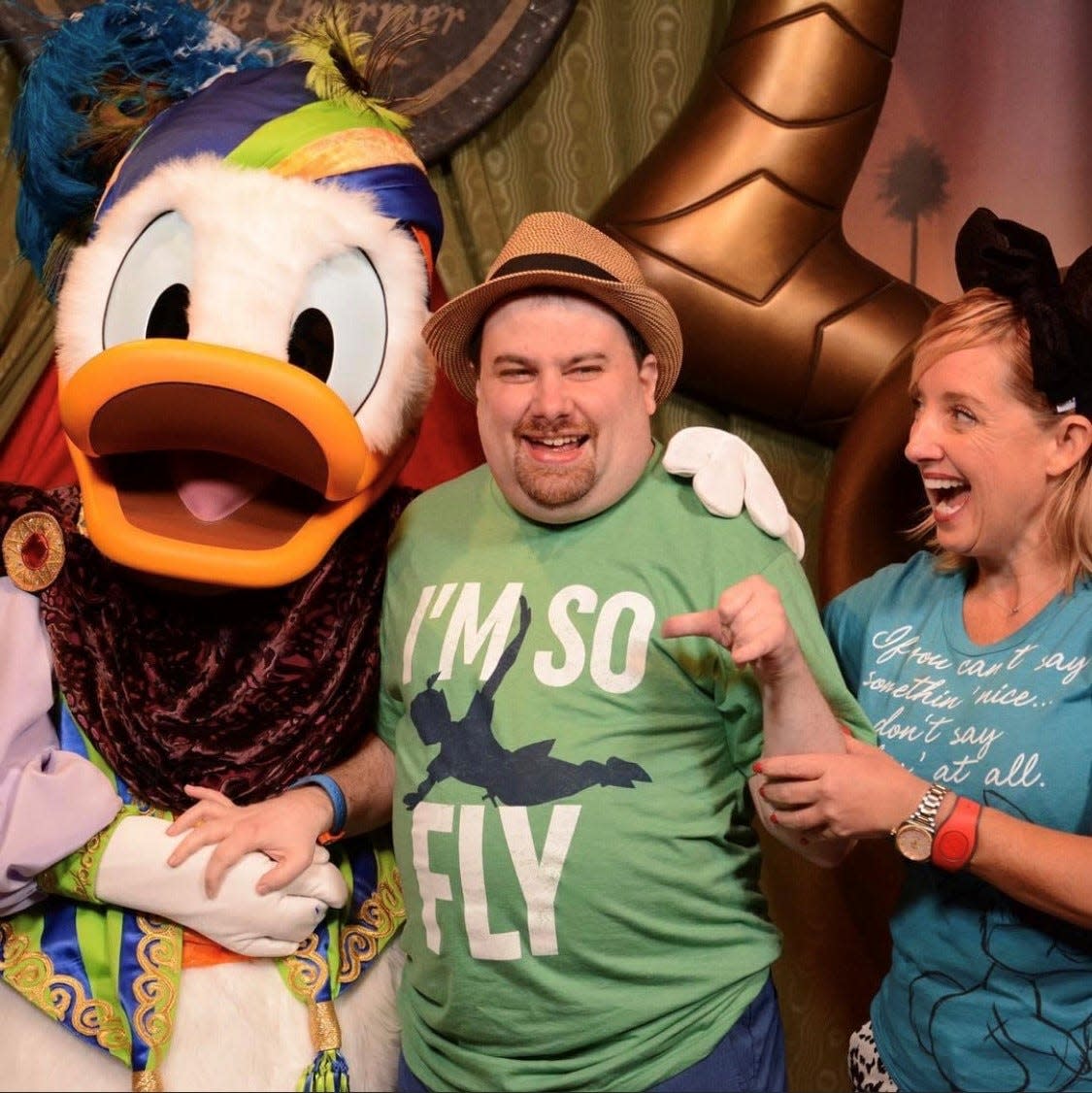
"Everything takes longer and is twice as stressful when you travel with someone with a disability. With that being said, it's important for us to remember that the needs and supports vary tremendously from person to person," Hill said.
Disney, compared to other places the Taylors tried to visit, "has by far probably been the most accommodating," said Jocelyn.
'My body won't cooperate'
Deb Jones of Indianapolis started visiting Disney parks in 1990 with her husband and their twin daughters, and they became Disney Vacation Club members in 2003.
In 2018, though, she had two strokes and heart failure, just a few months after completing a Disney bucket list goal of visiting four parks in a day and can't walk as much anymore.
The family still heads to Walt Disney World at least once or twice a year, she said, but now, "the visits are not so easy. My mind still wants to do what it used to, but my body won't cooperate."
Jones is still learning "how to make Disney work with my new situation," she said, starting with renting a wheelchair at the park in 2021.
Story continues below.
"It worked well until I had to turn it in at the end of the day and found myself very exhausted as we returned to our resort and I struggled to get back," she said. "That was not Disney's fault. It was me not knowing my needs. I can walk some but not a lot, and I don't know all my limits on vacation."
So, on a recent trip with her husband and now 28-year-old daughters, she arranged for a wheelchair to be delivered to the resort.
"We want to try another Disney cruise, but that will be a very new learning experience. There's a lot of mental adjusting, and I'm still a work in progress. I don’t have the answers but I’m trying to figure it out," Jones said.
DAS: A must-have, users say
Across Facebook affinity pages, there is big praise for Walt Disney World's DAS: Disabilities Accessible Services.
DAS, Disney states on the website, "is intended for guests who have difficulty tolerating extended waits in a conventional queue environment due to a disability."
This pass doesn't get guests onto rides immediately, or on all rides, but allows users to return at a time that's comparable to the current standby wait. Guests using DAS can then "enjoy other experiences in the park instead of physically waiting in the standby line."
Preregistration via live video chat is available up online to 30 days ahead of a park visit, but no less than two days before arrival. If it's a last-minute trip, registration can also be done in person at the park.
It can be time-consuming online. Jones said that before her family's most recent trip, it took her five hours to register, "so it should be more streamlined," she said. "I am hoping they will work on that."
IS YOUR DOG A CERTIFIED GOOD BOY?: You might need proof when traveling abroad with a service animal.
'I'M OFTEN FORGOTTEN': Imagine being 'forgotten' in an airport basement for hours. This traveler lived it.
Louisville, Kentucky, couple Katie DeNardi-Grant and Nick Grant are Disney pass holders along with their 6-year-old daughter Sloane, who has Down syndrome, cerebral palsy and Cortical Vision Impairment. She also has a seizure disorder and must be on a strict Keto diet.
As a child, DeNardi-Grant went to Disney World every year with her family. She became a travel agent as the pandemic unfolded, specializing in special needs travel with Unlocking The Magic Travel.
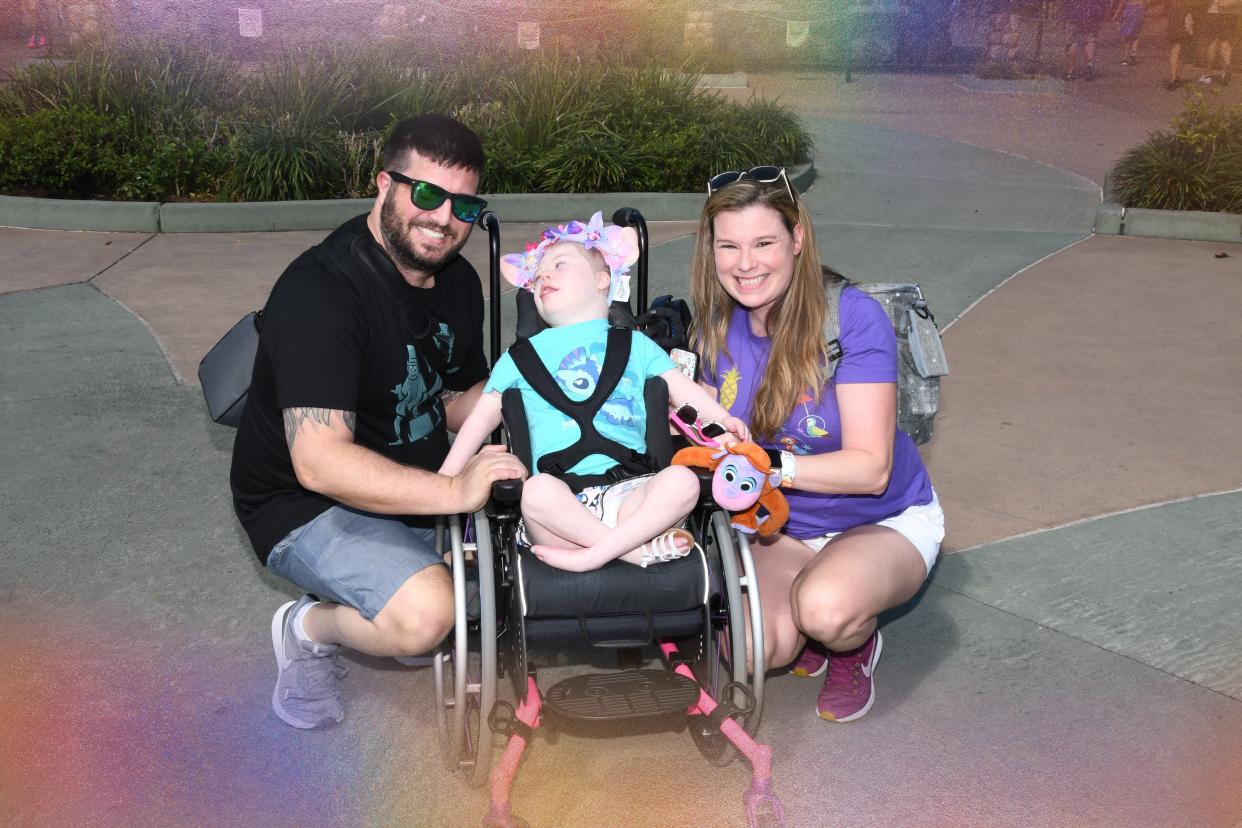
"We've used travel agents in the past, and they just didn't give me what I needed," she said. "So now that we've gone so much and I know the ends and outs of Disney and Universal, I decided to start helping others plan."
DeNardi-Grant and her husband have found that with DAS, they're able to see parades, stop for a diaper change, or enjoy the scenery while getting to their selected rides "and not having to feel super rushed and push Sloane to her limit."
The one DAS downfall, DeNardi-Grant said, is that if guests change their reservations or go to a park last minute, they don’t get the automatic two-ride selection they would normally get to pick 30 days before a trip.
Problems and solutions
Jocelyn Taylor's only complaint, "if I had one about Disney," she said, is that sometimes, the majority of vehicles in van-accessible lots are not vans, and have no sort of lift or ramp.
The Taylors use such parking, which helps with getting Raylan in and out of the vehicle and not having to make a long trek with a stroller and other necessities. The van-accessible parking has extra space on each side of vehicles if a lift or ramp needs to come down.
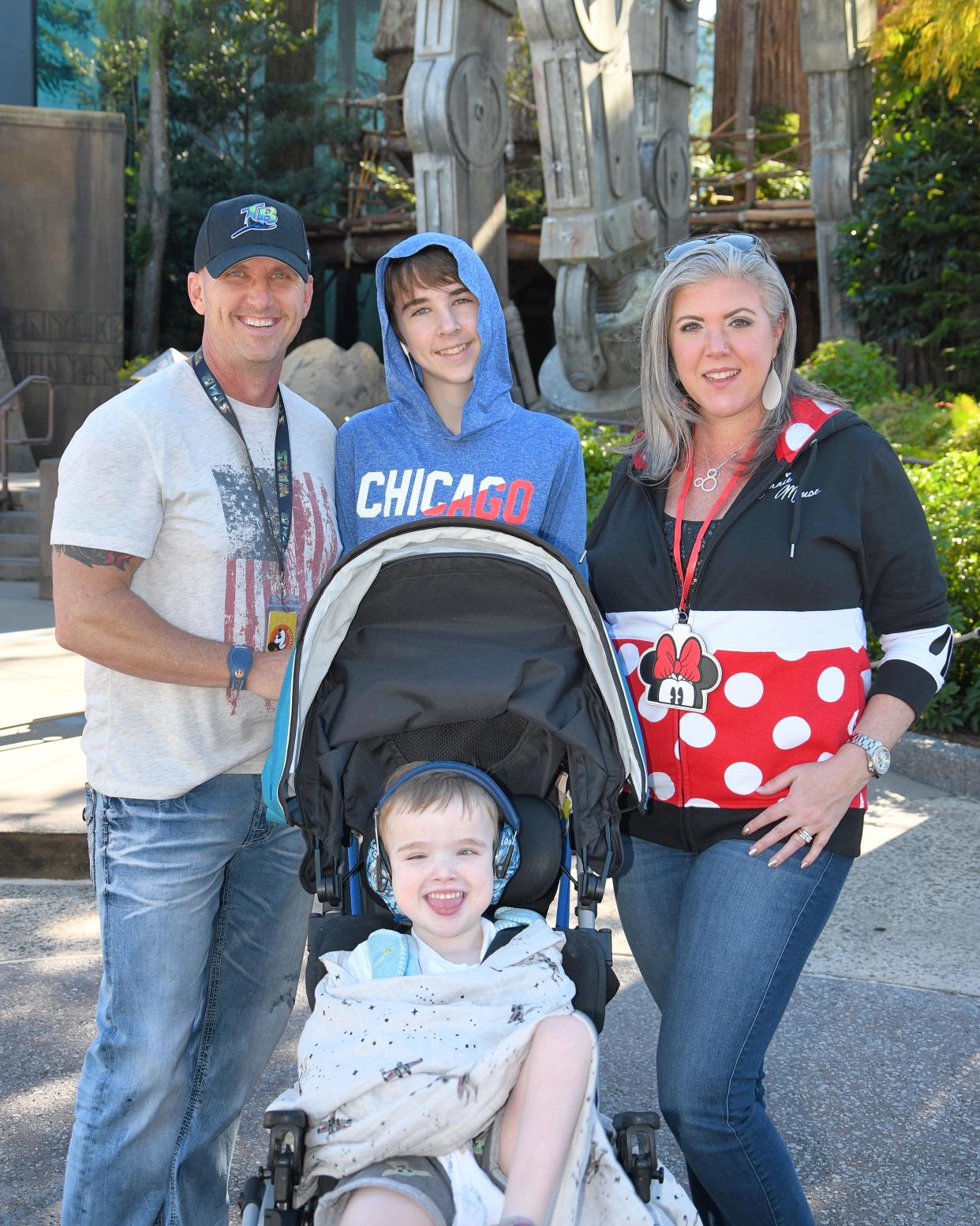
But, she said, that point pales in comparison to the help she's gotten around Walt Disney World's four parks.
If the Taylors hadn't moved to Tampa from Nebraska, Jocelyn said, "I don't know if I ever would have coordinated a trip to Disney. Because the logistics alone of getting him down here would have stressed me out to the point where I didn't feel like it was a vacation."
Now, she said, "Disney makes it so easy for us to get around in the park, and we don't have to worry about hotel accommodations or flying ... being a season pass holder means we can go for two or three hours and go home, and it doesn't overly exhaust our child."
Tips and timesavers
On her most recent trip to Walt Disney World with her family, Deb Jones became "overwhelmed with emotions and some guilt" one day, feeling "as if I was ruining their trip because of my limitations."
"As Mom, I used to organize and plan and lead everyone," she said. "They followed me into the parks as I headed to the plans I had made. Now, I plan, but I need to cancel when I become exhausted. And I need them, and as the mom, it’s hard to need your kid. ... Part of my adjusting to my new situation is learning to accept help."
'ENDO HAS STOLEN SO MUCH': Traveling with endometriosis requires planning
THE TRAVELERS YOU WON'T FIND AT AIRPORTS: Omicron impedes travel for people with disabilities
On Tami Hill's trips from New Jersey with her brother, she's gleaned new insight each time out.
She appreciates the training Disney cast members receive and practice in treating her brother Patrick with dignity and respect, speaking directly to him.
"He is nonverbal, so I answer," she said. "You wouldn't believe how many folks dismiss or totally ignore adults with disabilities. Pre-COVID, it seemed at least one character interacted with him every visit. I don't think it's a coincidence, I believe they make a real effort."
She offers a few tips for fewer stress days that could work at any theme park:
Have a schedule and then double the time you expect to spend, as you'll be providing care for someone who has high needs in an environment that is so busy and out of their normal routine.
Try to avoid weekends.
Ask cast members for quiet areas when needed.
“Family" or "companion" bathrooms and functional first-aid buildings offer privacy for restroom time and medication administration, and personal needs such as catheter changes.
Be realistic about what your loved one who is disabled can tolerate and will enjoy.
And practice patience.
"Remember that there are thousands of other families, all with their unique challenges, also trying to have the best vacation time possible," Hill said.
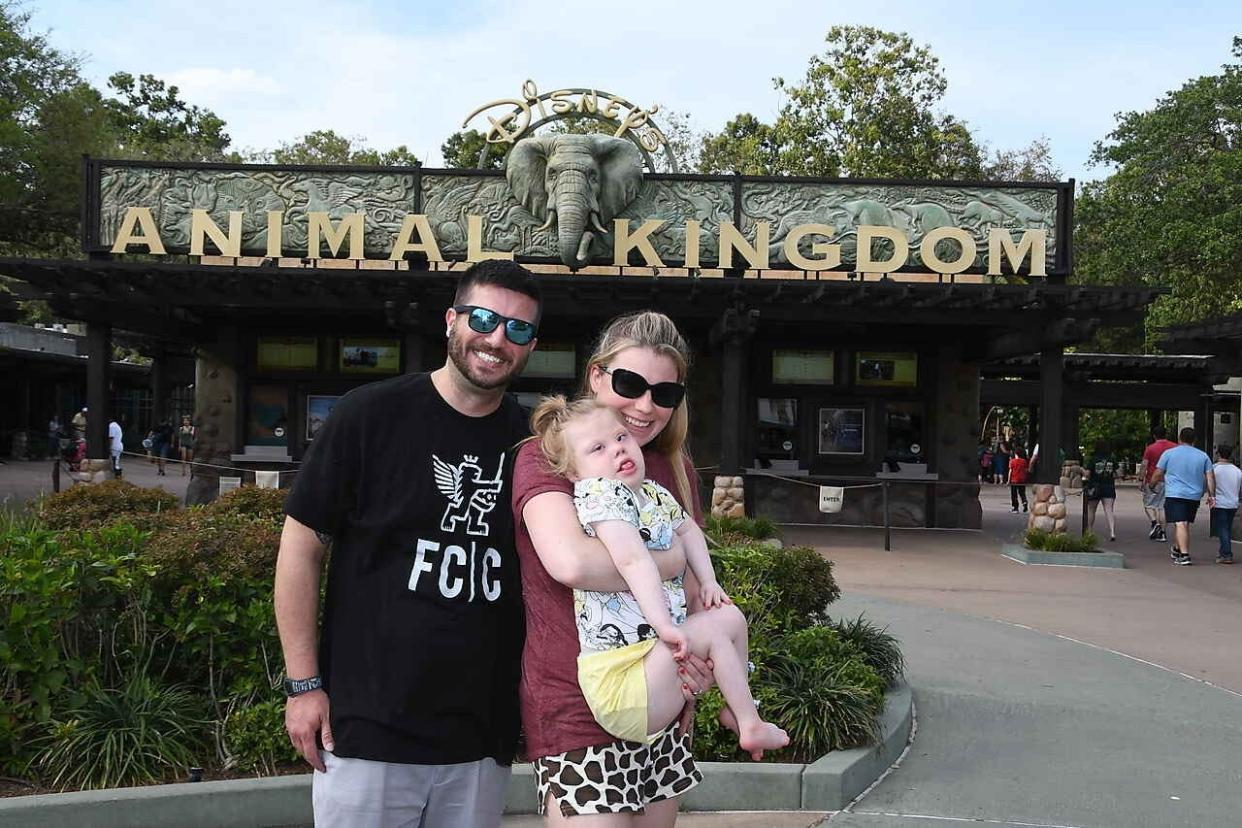
DeNardi-Grant encourages her clients to plan – but be ready to go with the flow, too.
"The best advice I give my clients is 'Take it slow.' Even if you don't make it through the whole park in one day, you've enjoyed the part you were able to make it to," she said.
"This last trip, Sloane recognized Minnie and Daisy during the parade and got the biggest smile," she added. "That makes it all worth it. She works super hard at therapy every day, so if I can give her a few moments of being a kid, I'm going to do it as much as I can."
Contact Britt Kennerly at bkennerly@floridatoday.com and Twitter: @bybrittkennerly; Facebook: /bybrittkennerly.
Share your story
This article originally appeared on USA TODAY: Theme park travel with disabilities: Families say extra prep pays off